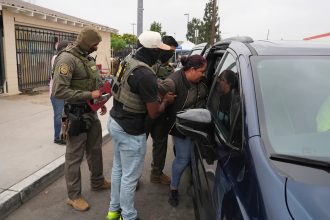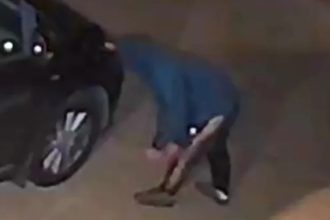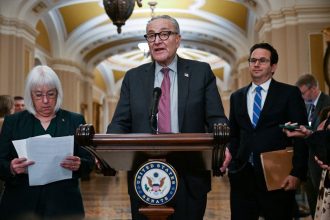President Donald Trump has — for the second time — pardoned Dan Wilson, a militia member who joined the Capitol riot on Jan. 6, 2021 and was also convicted of illegally possessing firearms in his Kentucky home.
Trump had already erased Wilson’s felony conviction for his role in the riot when he issued his Inauguration Day pardon for all of the participants in the attack. But Wilson was one of a handful of Jan. 6 defendants who remained incarcerated for other federal crimes. He was due to be released from prison in 2028.
Trump’s new “full and unconditional” pardon, dated Nov. 14, explicitly references Wilson’s firearms case, which ended with him pleading guilty to two felony gun offenses. Wilson, who has identified himself as a member of the Oath Keepers and Gray Ghost Partisan Rangers militia, had also pleaded guilty for his conduct on Jan. 6, which included a charge of conspiring to impede or injure a federal officer. U.S. District Judge Dabney Friedrich, a Trump appointee, sentenced Wilson to five years in prison, a sentence that began shortly before Trump took office.
“Dan Wilson is a good man. After more than 7 months of unjustified imprisonment, he is relieved to be home with his loved ones,” said Wilson’s attorneys, George Pallas and Carol Taylor,in a statement to POLITICO. “This act of mercy not only restores his freedom but also shines a light on the overreach that has divided this nation.”
In February, the Trump administration argued that Trump’s pardon did not cover Wilson’s firearms conviction, saying it was unrelated to the Jan. 6 attack. But within weeks, the Justice Department reversed course, saying it had reconsidered and believed the pardon should apply to Wilson’s gun crimes because they were discovered during an FBI search related to the riot.
Friedrichsharply rejected the administration’s shifting position, saying it had stretched the bounds of Trump’s pardon too far. She noted the Justice Department had taken inconsistent positions in other cases across the country. Trump, she said, could always issue a second pardon to cover the firearms offenses. An appeals court later backed her up, requiring Wilson to remain in prison while he appealed Friedrich’s ruling.
The Justice Department declined to comment on the new pardon. U.S. Attorney Jeanine Pirro had previously indicated her office would not defend Wilson’s continued incarceration during the appeal. The White House did not immediately respond to a request for comment.
The administration’s effort to expand Trump’s original pardon to cover a wide range of crimes unrelated to the Jan. 6 attack tested the legal boundaries of the pardon power itself in unprecedented ways. A judge in Florida released Jan. 6 defendant Jeremy Brown, also an Oath Keeper, from a seven-year sentence after his attorneys and the Justice Department claimed the Jan. 6 pardon covered Brown’s unrelated conviction for illegally possessing classified information and grenades.
Despite initial resistance from a judge in Maryland, a third Jan. 6 defendant, Elias Costianes, was also released from jail after the Justice Department declined to fight the appeal of his conviction for illegally possessing firearms.
Notably, the Justice Department refused to argue that Trump’s pardon extended to a criminal charge related to the discovery of child pornography on the computer of a Jan. 6 defendant in North Carolina, even though the material was discovered during the execution of a search warrant related to the attack. An appeals court in California is still weighing a bid by Jan. 6 defendant Benjamin Martin to extend the pardon to cover his own firearms convictions. But the court agreed to allow Martin to remain out of prison while his appeal is pending.
And another Jan. 6 defendant, Edward Kelley, was recently sentenced to life in prison for conspiring to kill the officers and FBI agents who investigated his involvement in the Jan. 6 attack. Kelley had contended Trump’s pardon covered the conspiracy charge, but the Justice Department opposed him.









